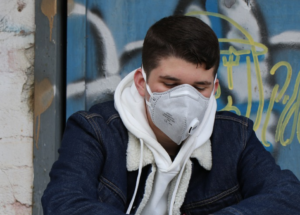World Mental Health Day was last weekend. The World Health Organization (WHO) called it “an opportunity to kick-start a massive scale-up in investment in mental health.” The global public health agency called on governments to invest more heavily in services for mental illness.
Mental Illness Awareness Week (MIAW) is behind us, but raising awareness is a year-round movement. The more we discuss mental health, the better; public discourse erodes the stigma, which often stands in the way of recovery.
Close to 1 billion people are living with a mental disorder, 3 million people die every year from the harmful use of alcohol and one person dies every 40 seconds by suicide. And now, billions of people around the world have been affected by the COVID-19 pandemic, which is having a further impact on people’s mental health.
WHO points out that more than 75 percent of people living with mental illness and substance use disorders receive no treatment in low- and middle-income countries. In light of COVID-19, more people than ever are struggling with symptoms of mental illness. Those same individuals are also facing challenges and barriers to treatment.
COVID-19 has disrupted access to mental health services, and WHO shares that it was hard enough for people to receive assistance before the pandemic. A new survey conducted by WHO confirms that accessing care has been disrupted or halted due to the global public health crisis.
Mental Health Service Barriers
The WHO survey indicates that 93 percent of countries worldwide are not supporting people with mental illness and substance use disorders. Dr. Tedros Adhanom Ghebreyesus, Director-General of the World Health Organization, said:
We are already seeing the consequences of the COVID-19 pandemic on people’s mental well-being, and this is just the beginning. Unless we make serious commitments to scale up investment in mental health right now, the health, social and economic consequences will be far-reaching.”
The WHO survey found:
- 67% of countries saw disruptions to counseling and psychotherapy.
- 65% saw disruptions to critical harm reduction services.
- More than a third (35%) reported disruptions to emergency interventions for severe substance use withdrawal syndromes.
- 30% reported disruptions to access for medications for mental, neurological and substance use disorders.
“We estimate, and preliminary information is telling us, that there may be an increase in people with mental, neurological and substance abuse-related conditions that will need attention,” said Devora Kestel, Director of WHO’s Department of Mental Health and Substance Use.
The survey highlights the need for more mental and behavioral health funding. While 89% of countries reported that mental health support services are part of their pandemic response plans, unfortunately, only 17% have allocated additional funding to meet the need for assistance.
Funding Mental Health Services
A more significant investment in mental health services pays off. According to WHO, countries that allocate funds for providing services for mental illness and substance use disorder will see huge returns. For every dollar spent on evidence-based treatment for depression and anxiety returns five dollars.
Before COVID-19 spread across the globe, depression and anxiety had a massive impact on the global economy. Each year, nearly $1 trillion in economic productivity is lost to untreated depression and anxiety. The above number is likely to increase exponentially due to life amid a pandemic.
In May, the U.S. Census Bureau reported that a third of Americans show signs of clinical anxiety, depression, or both. It’s been more than six months, and we are still fighting the spread of COVID-19. We cannot ignore the psychological toll of coronavirus; investing in mental health services saves lives.
While it’s true, accessing care is more challenging of late, there are still resources available to people struggling with mental illness and substance use disorder. If you or a loved one are having difficulty, please reach out for support.
Gender-Specific Mental Health Program
Please contact PACE Recovery Center to learn more about our gender-specific programs for men living with mental illness or substance use disorder. We rely on evidence-based approaches for helping men to lead fulfilling and productive lives in recovery. We are available around the clock to answer your questions and to begin the admissions process. We are standing by at 800-526-1851.



